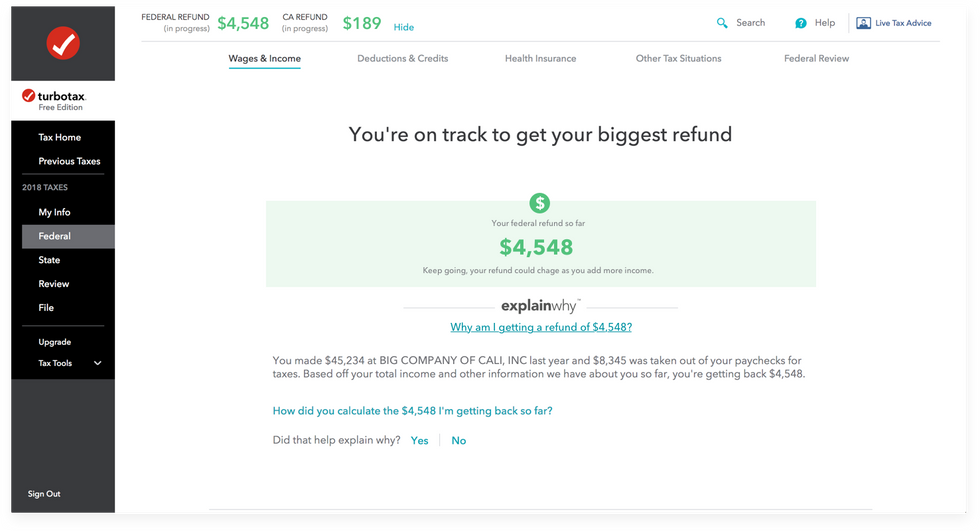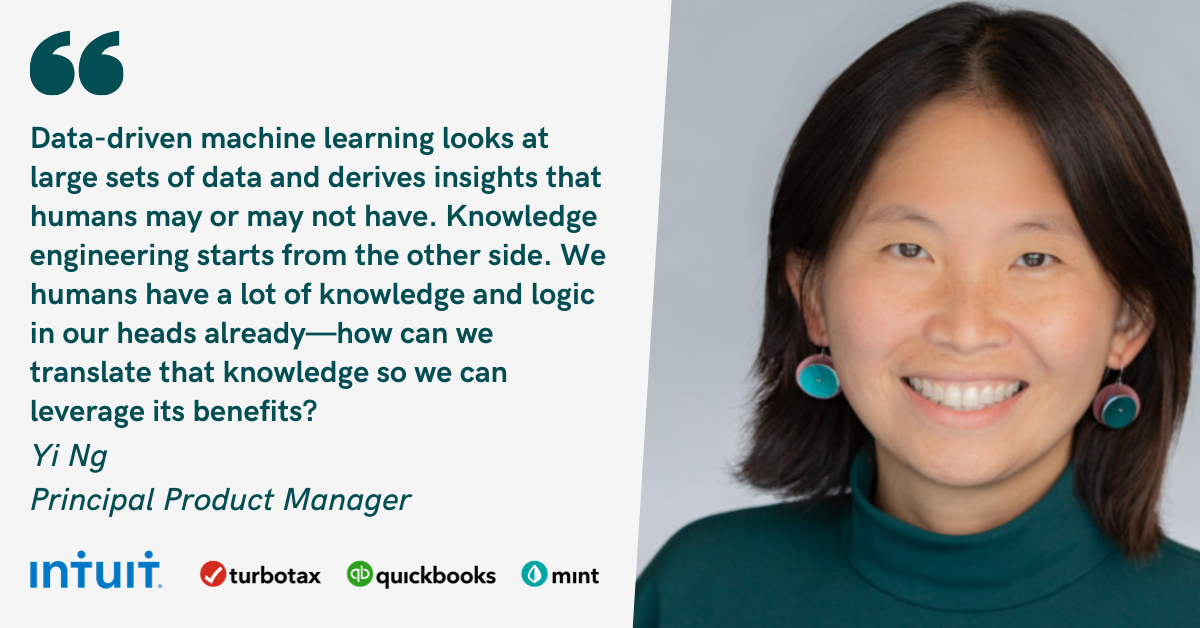How do you do your taxes? (Aside from begrudgingly, that is.) If you're one of the millions of Americans who files online, you may have used one of the projects that Yi Ng, Principal Product Manager at Intuit, has developed over her eight years at the global financial platform company known for products like TurboTax, QuickBooks, and Mint.
As a Principal PM on the Technology Futures team at Intuit, Yi has a host of responsibilities that span the business, from recruiting and managing a team to envisioning the consumer and small business products of the future. Her role requires her to stay up-to-date on the latest technology so she can manage highly technical products and teams. Currently, she's working on a project called Knowledge Engine (KE) platform, which uses Knowledge Engineering, a field of Artificial Intelligence (AI) that relies on rules devised by human beings.
I sat down with her to discuss her almost 15-year career in product management, her advice for technical product managers, why your product might need more work if customers tell you they like it (seriously), and how knowledge engineering is being leveraged at Intuit.
1. Do you need a tech background to be a technical PM?
The short answer is no, Yi explains, but you do need to understand technology and be passionate about continuous learning.
Yi completed a minor in Computer Science at UC Berkeley, used her coding skills in her first job at a consulting company, and has kept her tech skills sharp to this day. In fact, she organizes professors from UC Berkeley and other experts to give tech talks at Intuit, helping contribute to the continuous learning of a broad constituency at the company.
"I stay close to my engineers and work to maintain a detailed understanding of what the team is working on. Part of that means staying close to the ground and getting your hands dirty," she says. "Having deep technical appreciation is also critical—as is learning how to ask engineers the right questions to fill in gaps in your understanding."
To succeed as a technical PM, keep these 3 tips in mind:
- "Don't be afraid to keep asking questions until you can translate the technical feature in your own words."
- "Take classes in the fields where you lack technical understanding, and attempt to teach other product managers."
- "It's only with high-performing teams that you can really build products that customers will love...."
2. What makes a great PM?
Yi's ideal product manager has 5 key strengths:
- A feel for product and a passion for building awesome products
- An obsession with deeply understanding (and solving) customer pain points
- Technical know-how
- Relationship-building skills
- Excellent communication skills
Product managers come from a number of different fields and backgrounds, so rather than simply assessing past experience, Yi and her team like to ask questions that help them understand how a candidate thinks, prototypes, and makes decisions, such as:
- What information did you actively seek to create the plan and your approach in figuring out the initial pilot?
- What are the critical components of your initial version? How did you select them and why?
- What assumptions are you making that absolutely have to be true for your plan to succeed?
- What assumptions are you planning to test?
- What are the metrics that will determine success?
If you're interviewing at Intuit, keep these tips in mind:
- Always keep the customer in mind. "One question we often ask is: 'Who is the customer, and what is the biggest problem of theirs that you're solving?"
- Use data to make your case. For senior candidates, Yi's team often provides a case study and a couple of days to respond to it. "We're a data-driven company, and we want to see how candidates leverage data," Yi explains.
- Remember that great products need great people. Yi notes that "Product problems are a symptom of organizational problems. How do you go about nurturing your people to build high-performing teams?"
3. How do you assess product-market fit?
Early on in her career at Intuit, Yi was working on a new product that would become Intuit's QuickBooks Self-Employed offering, the fastest growing business at Intuit. She and her team were part of the earliest product phase—discovery of product-market fit— performing rapid and iterative testing of design prototypes with potential customers. The customer problem they were trying to solve: Get sole proprietors organized for tax time. Yi's team started out with the hypothesis that self-employed customers want to keep their personal and business expenses separated, so they designed an initial product around this idea. After a marathon day of testing the new interface with customers, each one said they had liked the product, but their behavior didn't show it.
The team felt something was off. They boldly decided to scrap it and start over. They ran another set of sessions the next day, this time with a new hypothesis centered on enabling the customer to break down business and personal expenses according to percentages and amounts. This time around, customers weren't just saying that they liked the product. They loved it.
"They were saying, 'Oh my gosh, can I pay you $100 a month to have this now?'" says Yi, smiling. The story underscores a common experience during early stage product management, where neither the customer nor the product team is able to fully articulate the customer need. Yi credits the success of that experience to Design 4 Delight, a process Intuit considers their "secret sauce," which entails deep customer empathy to develop a design that can be rapidly tested until arriving at a solution that adequately solves the customer's need—to the point where they fall in love with the product. For Yi, "That experience on QuickBooks Self-Employed was an example of how it's very different when you actually find that product-market fit—and how important it is to have a trusting environment with your team where everyone feels comfortable voicing their ideas and responding to feedback. Ultimately a fantastic product is a reflection of a high-performing team."
Her takeaways about building the right product:
- Build a high-performing team.
- Understand customer needs.
- Know what you can solve well.
- Keep pushing until you're sure you have identified and solved the customer's biggest problem.
4. What is knowledge engineering? How is it being used at Intuit?
One of the most essential parts of any PM's role is keeping up with the latest tech trends. For Yi, this is what keeps the job exciting — and to excel in her current role, she's taken a deep dive into knowledge engineering.
Unlike Machine Learning, which takes a bottom-up approach to implementing A.I.by enabling systems to learn and improve from experience without explicit programming, Knowledge Engineering takes a top to bottom approach, translating vast human knowledge (like tax code, in Intuit's case) into a rules-based system.
"Data-driven machine learning looks at large sets of data and derives insights that humans may or may not have," says Yi. "Knowledge engineering starts from the other side. We humans have a lot of knowledge and logic in our heads already—how can we translate that knowledge so we can leverage its benefits?"
Intuit's particular emphasis on knowledge engineering is due to the critical nature of its applications: personal and business taxes, payroll, and financial compliance in general. Because of this, the company's consumer, small business, and self-employed customers expect precise and logically interconnected results with a clear and personalized explanation of why the system provided a particular response or recommendation.
Yi explains that Intuit's Knowledge Engine (KE) platform leverages this in 2 main ways:
1. Accuracy + Explainability: KE enables Intuit software to not only show customers what their expected financial outcome is, but why.
Have you ever finished filling out your taxes online, seen your expected refund, and wondered how the product got to that exact number? With KE, TurboTax intrinsically correlates and intertwines more than 80,000 pages of U.S. tax code to deliver an accurate, contextual explanation for how, given your particular financial situation, your refund was calculated. Given that 55% of Americans don't feel confident about their finances, providing this explanation is a vital part of educating customers and building trust.

2. Personalized experiences: KE can create unique interfaces based on tailored situations, providing each user with a personalized product experience without developers having to code tens of thousands of screens to account for every possibility.
"What the Knowledge Engine does really well is surface the right question at the right time, to create an experience tailored just for you. This is possible because Knowledge Engine takes complex compliance rules such as taxes or accounting, and codifies and translates them into an experience that's tailored to your situation." says Yi.
"Imagine you have a student in your household who is about to turn 18 and needs to apply for student loans. With KE, we can use a combination of rules and insights to streamline this process for our customers so that they don't have to answer as many questions or manually input data that they have already confirmed in TurboTax to qualify for a loan."
Speaking as someone intimately familiar with the current inane, frustrating process of applying for student loans…sign me up!
If you have further questions for Yi on product management, let her know in the comments! And if you're interested in working in Product Management at Intuit, check out these jobs: Product Manager positions at Intuit.



